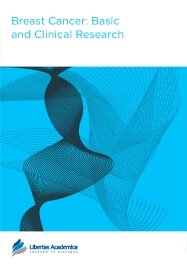

Publication Date: 04 Mar 2010
Type: Original Research
Journal: Breast Cancer: Basic and Clinical Research
doi: 10.4137/BCBCR.S4146

Introduction: Studies have shown that a diet high in fruit and vegetable intake, as well as a routine including daily exercise or physical activity, can independently affect relapse rates and survivorship in breast cancer patients. Fruits and vegetables contain powerful anti-oxidant molecules, capable of preventing tumor formation and proliferation. Exercise can lower circulating levels of estrogen, the female hormone responsible for tumor proliferation in the estrogen-sensitive form of the disease. The most beneficial results have been shown in women who exercise and consume a diet rich in fruits and vegetables. We studied the attitudes towards and behaviors related to fruit and vegetable intake and exercise in a cohort of breast cancer survivors in northwest Ohio.
Materials and Methods: Data were gathered from a survey sent out by the Northwest Ohio Branch of the Susan G. Komen For the Cure Foundation. We assessed and evaluated survivors’ self-reported beliefs, attitudes, and behaviors regarding exercise and fruit and vegetable intake.
Results: Nearly half of the survivors (46.5%) reported being unsure or in disagreement with the statement “Eating at least 5 servings of fruits and/or vegetables per day will reduce the risk of breast cancer recurrence.” Only 46.8% of those in agreement with the previous statement actually report eating at least 5 fruits and/or vegetables per day. With respect to exercise, 32.9% reported being unsure or in disagreement with the statement “Engaging in regular physical activity will reduce the risk of breast cancer recurrence.” Only 68.5% of those in agreement with the previous statement report any physical activity in the past 30 days.
Conclusions: Many breast cancer survivors do not appear to be aware of the benefits of diet and exercise. Further, a large proportion of those who are aware of the benefits do not adapt a healthy diet and exercise as part of their lifestyle. A majority of these survivors see a primary care physician, which we believe is the best venue to bridge this education gap. It is apparent by the pattern our data shows that more needs to be done to educate breast cancer survivors about the benefits of exercise and fruit and vegetable intake. Steps need to be taken to ensure that those who are educated also remain motivated to engage in a healthy lifestyle with the hopes of avoiding breast cancer recurrence.
PDF (571.52 KB PDF FORMAT)
RIS citation (ENDNOTE, REFERENCE MANAGER, PROCITE, REFWORKS)
BibTex citation (BIBDESK, LATEX)
XML
PMC HTML

The submission process for manuscript publication in Breast Cancer: Basic and Clinical Research is as easy as A,B,C! Any minor hiccups I encountered were quickly addressed by Libertas' expert staff via prompt emails, and the timelines between initial submission and publication are surely the shortest on record! I will definitely be submitting future manuscripts to this journal, and look forward to working with their professional and expert team.

All authors are surveyed after their articles are published. Authors are asked to rate their experience in a variety of areas, and their responses help us to monitor our performance. Presented here are their responses in some key areas. No 'poor' or 'very poor' responses were received; these are represented in the 'other' category.See Our Results
Copyright © 2013 Libertas Academica Ltd (except open access articles and accompanying metadata and supplementary files.)
FacebookGoogle+Twitter
PinterestTumblrYouTube